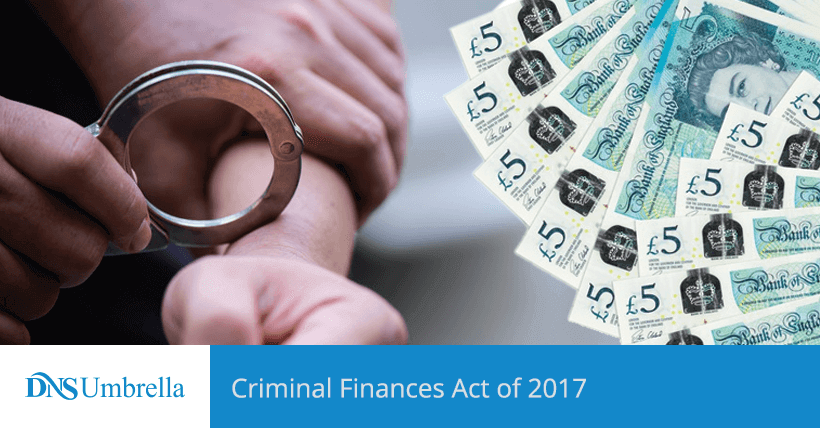The Criminal Finances Act of 2017 is an act introduced by the UK Parliament to make amendments in the proceeds of Crime Act 2002 and to bring expansion in the provisions to make it easier to seize funds obtained through criminal means. The new Criminal Finances Act 2017 targets tax evasion, money laundering, and corruption. The Act reflects the government's proactive approach to seize criminal assets and is a legislative tactic to reduce financial crimes. It expands on the current legislation to offer special enforcement powers and additional measures to law enforcement agencies and partners to combat tax evasion, corruption, money laundering and financing of terrorism.

Following are the significant changes introduced by the Act:
- Improved the ability to investigate the crime proceeds: The Act primarily entails unexplained wealth orders, information orders, and application to Politically Exposed Persons (PEPs).
- Reformation of the Suspicious Activity Reports (SARs) regime: With the introduction of Super SARs, the Act further includes more generous information sharing, submitted as a joint report of information collected from various regulated sources. It introduces the right to extend the moratorium tenure over suspicious exchanges for a maximum of seven months.
- Improved civil power to recover criminal proceeds: This change highlights the recovery of assets gained through criminality like storing of money in bank accounts, personal property items with the use of civil power.
- Measures to battle terrorist financing: The Act further includes anti-money laundering laws to penalise potential terrorist funding.
- New corporate tax offences to curb the facilitation of tax evasion: If an individual has previously evaded taxes and was facilitated by the guidance or activities of those involved in an organisation, even though the individual would be charged for misconduct and those who facilitated the crime would be penalised for aiding and abetting, the corporate entity at large will not be liable for the actions of the workers.
Corporate Tax Offences
One of the main aspects of the Criminal Finances Act is the introduction of the two new corporate tax offences. These new corporate tax offences extend the obligation for tax evasion from the person and any facilitators to the company/organisation with a substantial risk of criminal prosecution and fines. The primary function of a tax collection agency is to minimise tax frauds in the country. During the recent ten years, HMRC has alarmingly increased the prosecutions for tax fraud, from around 258 convictions in 2006/07 to 1,135 in 2015/16. These two new tax offences have been created so that a corporation may be held liable or prosecuted under the following situations –
- Failure to prevent the facilitation of UK Tax evasion– This offence main aim is to catch the corporations involved in the facilitation of tax evasion in the UK
- Failure to prevent the facilitation of foreign tax evasion– This offence aim is to catch the entity involved in the facilitation of foreign tax evasion in association with the UK based office or in the case of dual criminality with the UK.
How do the new offences work?
These new offences are applicable to companies, partnership firms, and limited liability partnerships failed in preventing the criminal facilitation of tax evasion. These new rules do not apply to individuals as they can be prosecuted under the existing laws. Following criteria has been formulated for failure to prevent the criminal facilitation of tax evasion –
- There must be criminal tax evasion under either UK law or foreign law.
- It must be empowered by the employee, agent or individuals performing services for or on the organization’s behalf. The organisation must have failed to prevent that individual from empowering the facilitation or committing the tax fraud.
Eventually, relevant bodies need to contemplate whether the actions of their employee, agent or individuals who offer services for or on behalf of your organization have the motive, the chance, and the way to facilitate tax evasion offences criminally, and if so, how this risk may be tackled. For a well-established business, the law prompts it to tread in illegal waters precariously. Since a company will be liable for the actions of the representative acting on its behalf, the law evidently highlights the extent of penalisation and fines wrongful deeds might have. Whether in the UK or overseas, any failure to prevent legal compliance is liable to strict probe and subsequent penalty.
How can DNS Umbrella assist you with compliance?
DNS Umbrella offers lucrative schemes and opportunities to companies who wish to enrol for our exceptional consultancy services. Your business can avail the following benefits of working with DNS Umbrella:
- Accredited compliance and accounting specialists
- Thorough understanding/guidelines of Criminal Finances Act.
- Risk assessment of your organisation against the Criminal Finances Act 2017
- Licensed filing of regulatory documents.
- Exceptional assistance services.
- Expert advice on prevention from Money laundering, Tax evasion and corruption.
- Superior training resources and consultancy services.
With DNS Umbrella, you can further your organisation's legitimacy and ensure absolute compliance. At DNS, we work to hedge risks, provide our expert assistance and prevent you from situations that can create problems for you and your enterprise in the future. You can schedule a free consultation session with our experts today and avail expert advice on matters that could profoundly impact your business.